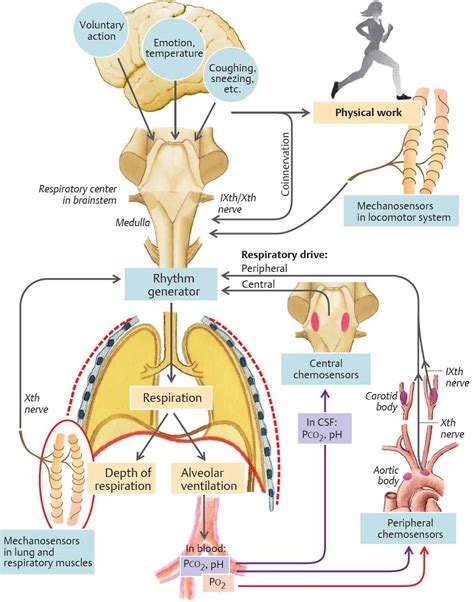Breathing Regulation - Benefits & Methods
Breathing Regulation FAQ
What is the regulation of breathing?
The regulation of breathing is an essential physiological process involving neural circuits, chemical sensors, and feedback loops. This system ensures that the body’s oxygen and carbon dioxide levels are maintained within narrow physiological limits, adapting to various internal and external challenges.
Where is breathing regulated?
Breathing is primarily regulated by the brainstem, specifically in areas called the medulla oblongata and the pons. Neurons in these regions send rhythmic signals to the muscles involved in breathing, primarily the diaphragm and the intercostal muscles (the muscles between your ribs), telling them when to contract and relax.
How does your body regulate your breathing?
Neural Regulation: Your body also uses afferent signals, feedback from other parts of the body like the stretch receptors in the lungs, to help fine-tune the breathing process. For example, if the lungs are overinflated, these receptors send a signal to the brain to halt inhalation, preventing potential damage.
Why is it important to understand the mechanisms behind breathing regulation?
Understanding the mechanisms behind the regulation of breathing is critical, not just for medical practitioners and researchers but also for individuals who engage in activities that test the limits of respiratory function. Get instant access to 25+ premium quizzes, mini-courses, and downloadable cheat sheets for FREE.
Breathing Regulation References
If you want to know more about Breathing Regulation, consider exploring links below:
What Is Breathing Regulation
- https://www.respiratorytherapyzone.com/regulation-of-breathing/
- https://www.britannica.com/science/human-respiratory-system/Control-of-breathing
- https://bio.libretexts.org/Bookshelves/Introductory_and_General_Biology/Book%3A_Introductory_Biology_(CK-12)/13%3A_Human_Biology/13.37%3A_Respiratory_System_Regulation
- https://www.nhlbi.nih.gov/health/lungs/body-controls-breathing
- https://teachmephysiology.com/respiratory-system/regulation/
- https://www.osmosis.org/learn/Breathing_cycle_and_regulation
- https://www.kenhub.com/en/library/anatomy/anatomy-of-breathing
- https://www.khanacademy.org/science/how-does-the-human-body-work/x0fe8768432761c62:breathing-and-exchange-of-gases/x0fe8768432761c62:regulation-and-disorders-of-respiration/v/the-regulation-of-respiration
- https://k12.libretexts.org/Bookshelves/Science_and_Technology/Biology/13%3A_Human_Biology/13.25%3A_Regulation_of_Breathing
Breathing Regulation Information
Explore Related Topics
Music Therapy: A Novel Approach to Diabetes Stress Management?
Uncover the potential of music therapy as a unique stress reduction technique for individuals with diabetes
